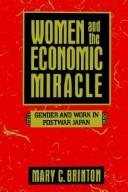| Listing 1 - 2 of 2 |
Sort by
|

ISBN: 052091547X 0585041180 9780520915473 9780585041186 0520075366 0520075633 9780520075368 9780520075634 0520089200 9780520089204 Year: 1993 Publisher: Berkeley, CA : University of California Press,
Abstract | Keywords | Export | Availability | Bookmark
 Loading...
Loading...Choose an application
- Reference Manager
- EndNote
- RefWorks (Direct export to RefWorks)
This lucid, hard-hitting book explores a central paradox of the Japanese economy: the relegation of women to low-paying, dead-end jobs in a workforce that depends on their labor to maintain its status as a world economic leader. Drawing upon historical materials, survey and statistical data, and extensive interviews in Japan, Mary Brinton provides an in-depth and original examination of the role of gender in Japan's phenomenal postwar economic growth.Brinton finds that the educational system, the workplace, and the family in Japan have shaped the opportunities open to female workers. Women move in and out of the workforce depending on their age and family duties, a great disadvantage in a system that emphasizes seniority and continuous work experience. Brinton situates the vicious cycle that perpetuates traditional gender roles within the concept of human capital development, whereby Japanese society "underinvests" in the capabilities of women. The effects of this underinvestment are reinforced indirectly as women sustain male human capital through unpaid domestic labor and psychological support.Brinton provides a clear analysis of a society that remains misunderstood, but whose economic transformation has been watched with great interest by the industrialized world.
Labor & Workers' Economics --- Business & Economics --- asian history. --- california series on social choice and political economy. --- dead end jobs. --- domestic labor. --- education. --- educational system. --- family. --- gender roles. --- gender studies. --- gender. --- industrialization. --- japan. --- japanese economy. --- japanese education. --- japanese family. --- japanese history. --- labor. --- low paying jobs. --- postwar economic growth. --- postwar japan. --- psychological support. --- regulation of women. --- seniority. --- traditional gender roles. --- women in the workplace. --- work experience. --- work. --- workforce. --- workplace. --- world economic leader.
Book
ISBN: 1978808615 1978808585 Year: 2021 Publisher: New Brunswick : Rutgers University Press,
Abstract | Keywords | Export | Availability | Bookmark
 Loading...
Loading...Choose an application
- Reference Manager
- EndNote
- RefWorks (Direct export to RefWorks)
Not Your Mother’s Mammy examines how black artists of the African diaspora, many of them former domestics, reconstruct the black female subjectivities of domestics in fiction, film, and visual and performance art. In doing so, they undermine one-dimensional images of black domestics as victims lacking voice and agency and prove domestic workers are more than the aprons they wear. An analysis of selected media by Alice Childress, Nandi Keyi, Victoria Brown, Kara Walker, Mikalene Thomas, Rene Cox, Lynn Nottage, and others provides examples of generations of domestics who challenged their performative roles of subservience by engaging in subversive actions contradicting the image of the deferential black maid. Through verbal confrontation, mobilization, passive resistance, and performance, black domestics find their voices, exercise their power, and maintain their dignity in the face of humiliation. Not Your Mother’s Mammy brings to life stories of domestics often neglected in academic studies, such as the complexity of interracial homoerotic relationships between workers and employers, or the mental health challenges of domestics that lead to depression and suicide. In line with international movements like #MeToo and #timesup, the women in these stories demand to be heard.
Women household employees, Black, in art. --- Women household employees, Black, in literature. --- African American women household employees in art. --- African diaspora, black artists, artists, black female subjectivities, black females, fiction, film, visual art, performance art, Alice Childress, Nandi Keyi, Victoria Brown, Kara Walker, Mikalene Thomas, Rene Cox, Lynn Nottage, performative roles, deferential black maid, black maid, verbal confrontation, interracial homoerotic relationships, mental health challenges, depression, suicide, #MeToo, #timesup, Black Women’s Domestic Labor, Twentieth Century, maid, Working-Class Women, Domestic Sphere, Undocumented Caribbean Domestic Laborers, The True Nanny Diaries, Servitude, Sugar Baby Sphinx, uholi’s Massa & Minah, Minding Ben.
| Listing 1 - 2 of 2 |
Sort by
|

 Search
Search Feedback
Feedback About UniCat
About UniCat  Help
Help News
News